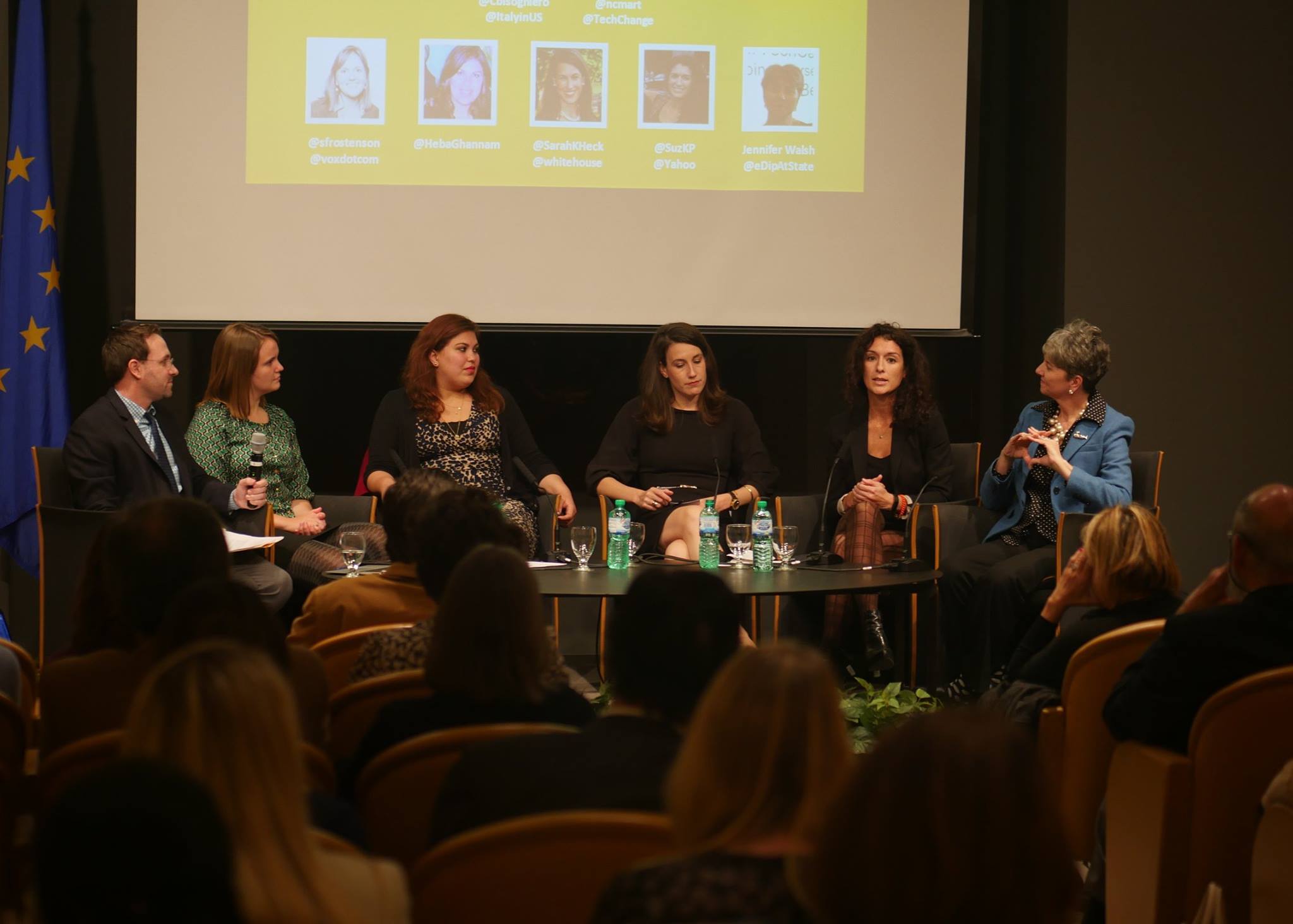Social media has become a very important diplomacy tool to engage with the public. Realizing the evolving nature of diplomacy in the 21st century, the Italian embassy in Washington, DC regularly hosts their #digitaldiplomacy series to discuss the role of technology in diplomacy and to engage with all stakeholders and partners.
Today, there are tech tools, beyond social media, that have the potential to promote diplomacy and engagement, so we collaborated with the Italian embassy to discuss the other players in the digital diplomacy field. Moderated by our founder, Nick Martin, our panel included Sarah Frostenson (Vox Media), Heba Ghannam (State Department Professional Fellow), Sarah Heck (White House), Suzanne Philion (Yahoo!), and Jennifer Walsh (U.S. Department of State). Our panelists shared their experience about the impact that data visualizations, digital mapping, and e-learning can have on diplomacy today.
Here are a few takeaways of an evening of great insights and engaging conversations:
Digital maps can tell powerful stories
While important pdf reports may be buried online, maps can tell a compelling story understood by all.
The ongoing refugee crisis has affected many families, but for someone living far away from the region, it can be difficult to see its global impact. Sarah Frostenson from Vox Media presented how putting the refugee story on a map, like The Refugee Project can have a much bigger impact and urge respective governments to work towards a solution.
Mapping has been a great asset in disaster response. Digital maps have allowed international humanitarian organizations to collaborate and better coordinate relief efforts during disasters like the recent earthquake Nepal.
Online education can help bring equal opportunities to people across borders
In 2011, social media brought together thousands of social activists together in Tahrir Square in Egypt to demand change from their leaders. The power of the Internet to create a movement led the founders of Tahrir Academy to leverage the same tool to bring equal educational opportunities to the people of Egypt. Heba Ghannam explained that as the only online learning platform in Arabic, Tahrir Academy was able to influence other learners beyond Egypt, and in the Arab world.
Many refugee communities may not have access to these tech tools in the refugee camps, but the potential for e-learning to help refugees continue their education in refugee camps is undeniable. Heba Ghannam recalled Syrians using Tahrir Academy’s online content for their education initiatives in the refugee camps in Egypt in 2012.

From left to right: Nick Martin, Sarah Frostenson, Heba Ghannam, Sarah Heck, Suzanne Philion, and Jennifer Walsh
Online learning and engagement platforms allow the public to engage with decision makers and experts
E-learning initiatives like Tahrir Academy have created bridges between the Arab expat communities working at renowned universities around the world and the eager learners from the Arab world.
The U.S. State Department’s Virtual Student Foreign Service platform engages U.S. citizen students’ by harnessing their expertise and digital excellence in the work of the government. We are excited to collaborate with the State Department on GovUp, an online platform where U.S. diplomats from around the world can engage virtually with other diplomats and get trained.
However, whether it is in Egypt or the U.S., it is always very crucial to localize the content so that it is relevant and applicable for the local population.
An increased need for engagement between the tech and foreign relations experts
There are tech experts and foreign relations experts, but it is rare that someone can influence both the sectors. After eleven years at the State Department, Suzanne Philion, is now at Yahoo!, where she is able to look at tech initiatives with a different lens. Suzanne and Sarah Heck from the White House, both stressed the importance of breaking out of organizational bubbles, and engaging with parties from other sectors. Tech companies and international organizations need to collaborate more to best use the available technology to meet citizen’s demands, while respecting their data privacy.
It was clear that tech tools beyond social media can significantly impact diplomacy today, but there are clearly some important issues to think about when talking about data-driven diplomacy. Diplomacy and decision-making are increasingly becoming more data-driven, and citizens are demanding more transparency from their governments. However, as more data is becoming available online, data privacy becomes an important concern for all. How do you navigate data transparency and data privacy? Also, online content available for all can help raise funds and help populations in need, but are also being used by terrorist organizations for recruitment purposes. Where do you draw the line?
These important questions are being discussed in the tech industry as well as the international relations and development industry today. You can continue the conversation on digital diplomacy by following the Italian Embassy’s #digitaldiplomacy series. We will also be discussing these topics in relation to data visualization in our course on Technology for Data Visualization this month.
Missed the panel? You can watch the recording here.
